Some new wines crossed my path this last week – a delicious Chablis-style Chardonnay, and a juicy Pinot Noir – both from the Wrekin Vineyard in Marlborough. I tracked down the maker of these, and posed a few questions – with Daniel Sorrell.
WineFolio: Tell me a bit of your background to this point – how did you end up making wine in Marlborough?
Daniel Sorrell: My dad and I are both football fans. In 1998 dad bought us tickets to the World Cup in France for what was meant to be a 2 week holiday, with a visit to my older sister in London. I never went home, ended up spending 9 years in the UK. Early on I did seasonal work on the boats in the Med where I crewed with a French guy. We went to visit his family in Montpellier where his father grew grapes and made wine for the family label. We spent about a week there. It was the middle of harvest and it was an eye opener for me. I could see the hard work, but what really stood out was the passion. Harvest was such a celebration, full of eccentric people from around the world, all driven to make great wine. I loved it. I headed back to London, back to working in finance, but I didn’t forget that experience. In London I did a WSET course but ultimately, I knew I wanted to make wine – I’m not suited to hospitality and I’m not a great writer. I wanted to get my hands dirty.
In my late 20s I headed back to New Zealand to study at EIT in Hawkes Bay. I’m not a natural student but studied hard and gained hand-on experience at Vidal and one of Villa Maria’s brands. That practical experience made me sure I was on the right track. Once qualified I did back to back vintages in France, America, and Australia, finally ending up back home in New Zealand 8 years after graduating. I was fortunate to work under many talented winemakers who helped me refine my craft and better understand what I’m trying to achieve.
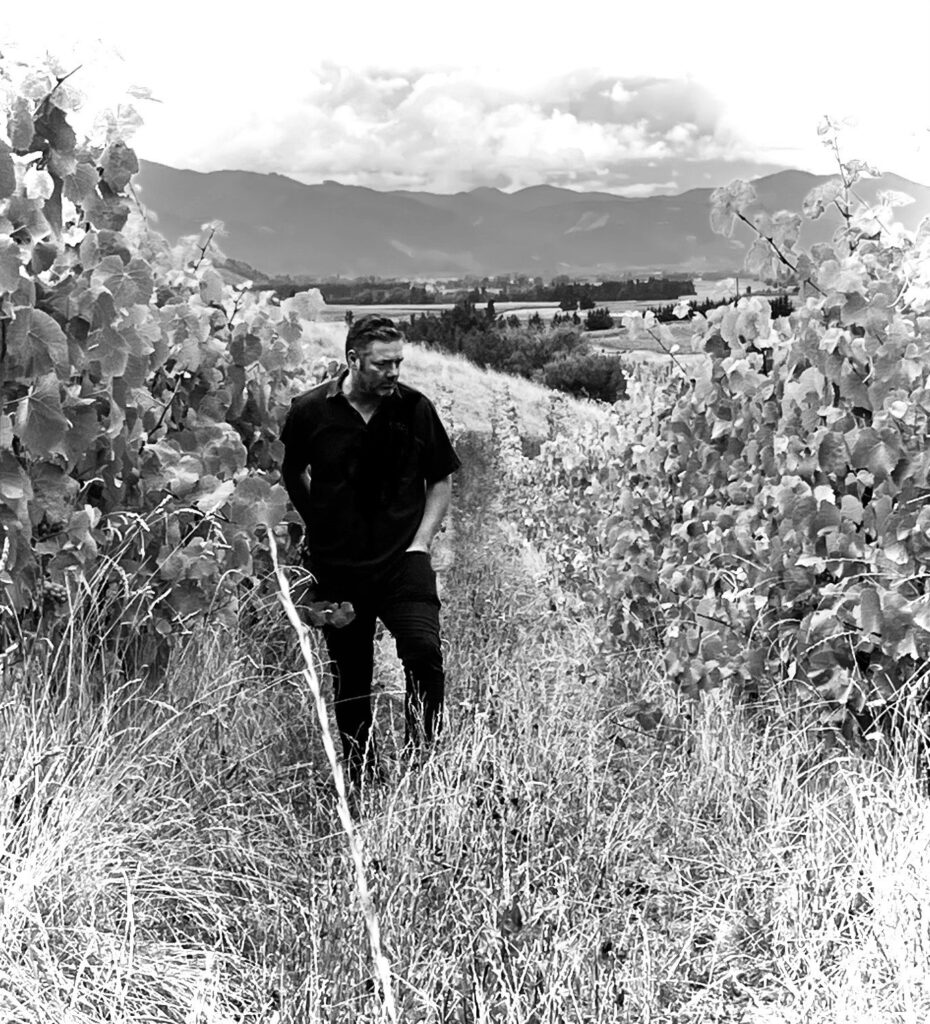
WF: And how did the label with your own name on it come about?
DS: I have been fortunate to make wine for some exceptional wineries over my career. I think every winemaker wants to make something of their own – a legacy perhaps. This is my opportunity to make wines that reflect myself. There is no hiding behind what I am doing. My project it’s the fruit of the love and passion that I have for my craft.
My father passed away just as I started making my first wines under my own label. He was a massive part of my life and I miss him dearly. The Sorrell Wines logo is his family crest which is originally from France. I’m proud to have given his name to this venture.
WF: Are you using your connection to get some great fruit from great places – the Wrekin? And did I hear plans to get fruit from Churton Vineyard, Cowley Vineyard?
DS: I have been in the industry now long enough to know what a great site is. I only want to work with passionate people who trust me to reflect their vineyards in my wines. It’s a little selfish, but you get maybe 20 shots as a winemaker to make something you love.
Start with the best product you can, with people that have the same drive. I’m very fortunate to be sourcing from these sites, and hope they stay true to their origins. I started with the Wrekin in 2021 and have added a Pinot Noir from Churton and a barrel and concrete aged Sauvignon Blanc from Auntsfield in 2022. It’s such a honour and privilege to work with such talented people who work these amazing sites.
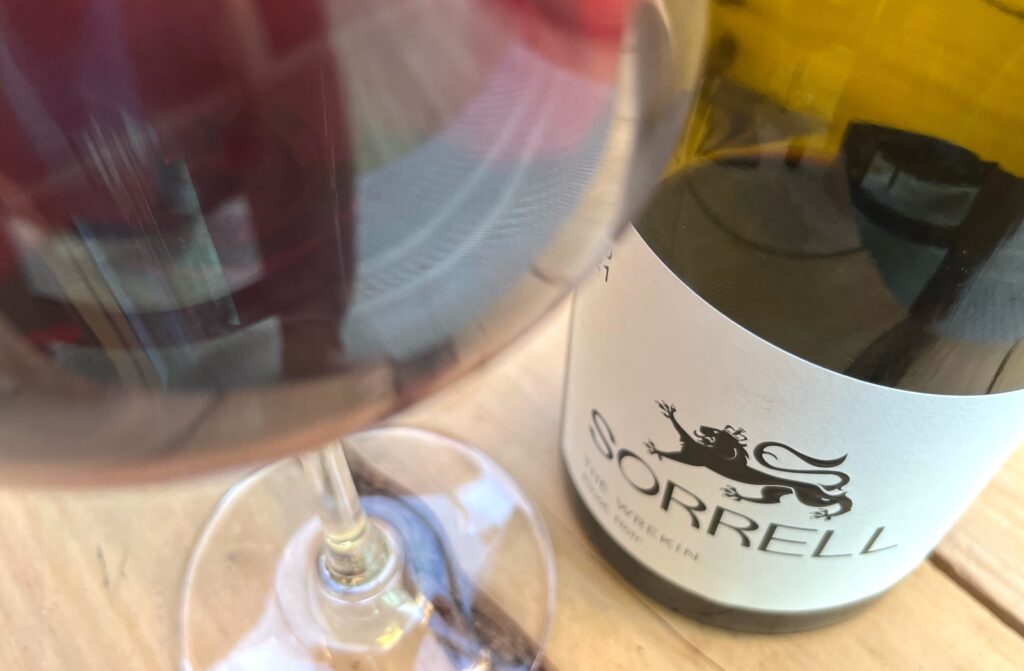
WF: Can you tell me a bit more about the vineyards you are using? Soil, clones etc?
DS: I crafted 2 wines from Wrekin Vineyard in 2021 – Pinot Noir and Chardonnay. The Wrekin is located on a dramatic hillside vineyard with a unique variety of soils. They work biodynamically, constantly adapting their practices to their vineyard’s demands. Deeply respecting their environment, they promote biodiversity in many ways to protect and preserve their land.
The unique gravel and rock soil composition combined with the gentle sloping contour of this block ideally stresses the vines and produces stunning fruit with phenomenal concentration varietal intensity and bright, natural acidity.
By avoiding chemical fertilizers and herbicides, a condition of biodiversity in the soil allows the vines to naturally repel most diseases through the presence of beneficial organisms and bacteria.
As stewards of the land, they have an ethical, social, and ecological responsibility to ensure the sustainability of our place for generations to come. Integrated Farming philosophy is rooted in a holistic approach where the vineyard is one part of an interconnected farm ecosystem. In addition to 30 hectares of rolling slopes of vineyards, you will find Merino ewes, cows, chickens, dogs, cats, deer, vegetable gardens and fruit orchards – all working harmoniously together to enhance the well-being of the land and, ultimately, the well-being of the people.
The grapes used for the Pinot Noir are a mix a different Burgundian clones: 777, 667, 114, 115, and some Abel. The amazing relationship we have is that I can pick some parcels at optimum ripeness… so there were three different picks in 2021 to make a 1000L of wine.
The Chardonnay is entirely Clone 95 from an elevated northeast-facing hillside. There is a wonderful diversity on the property, and the wine finds its compelling character and structure here. The soil has a deep layer of clay-based loess over the alluvial gravels. This denser soil type has a greater water-holding capacity, and they aim to dry farm if the season allows. The vines tend to have minimal soil compaction, resulting in a healthy microbial ecosystem and a naturally balanced substructure.
The precise nature of their farming results in healthy soils, healthy vines and delicious wines. The many ecological benefits of organic practices include healthy soils, healthy waterways, biodiversity, and a safe place for bees and other beneficial insects. Using natural products throughout production provides a safe and happy work environment.
Pinot Noir:
• Flowering conditions for Pinot noir here in Marlborough were not ideal, there was quite a bit of shrivel. That’s why 2021 Wrekin Pinot is 100% destemmed.
• Clones: 777, 667, 114, 115, 828.
• Barrel coopers : Francois, Mercurey, D&J all 3 years old – stylistic choice made to keep fruit purity and use older oak for structure support and balance.
• Time on skins: 5 days cold soak, 6 days fermentation, 11 days post.
• Inspired by: how the fruit and the season were and willing to showcase the vineyard and fruit purity.
Chardonnay:
• Pressed to tank, racked to stainless steel where it started fermentation and after a 2 brix drop it was cooled down to 12 degrees and barrel down into 5 years old barrels (same coopers that I use for Pinot).
• Clone 95.
• Inspired by: how the fruit and the season were and willing to showcase the vineyard and fruit purity. Aiming for a Chablis style.
They were both inoculated with a pied de cuve started in the vineyard. I do like to emphasize the fact that my ferments start in the vineyard because every great wine is made in the vineyard.
Everything starts from the vineyard and goes back to it. The marc goes back to where it belongs and turned into compost – and there we go, another cycle starts.
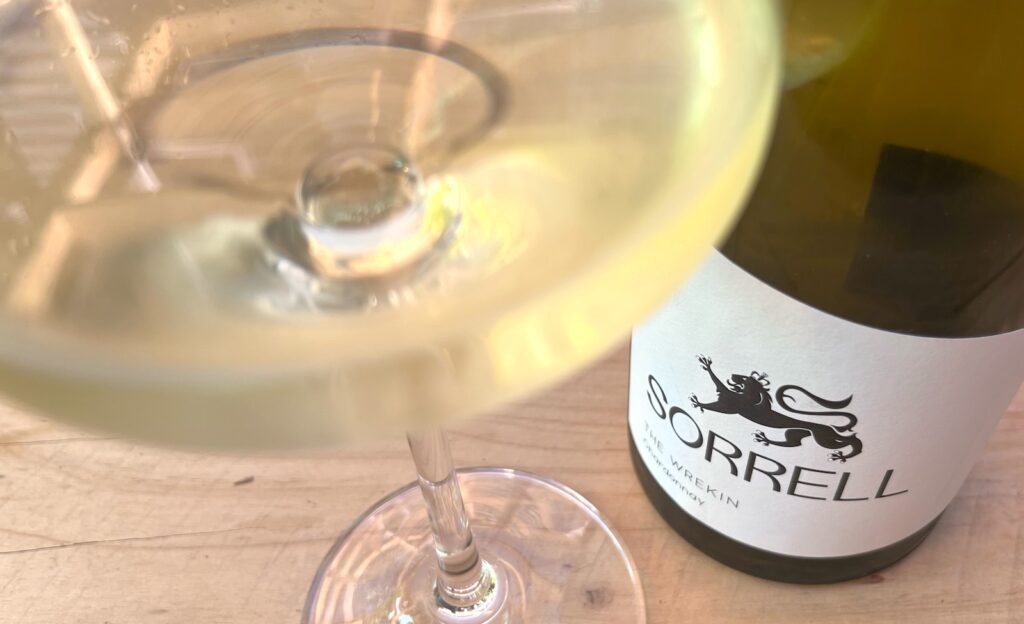
WF: Can you tell me a bit about your winemaking style/philosophy?
DS: Respect for the vineyards is the key for me. I want to showcase the vineyards and fruit purity. My wines are crafted with minimal intervention, and I use no new oak. I used no yeast – my ferments start in the vineyard five days before picking. From there, I transfer the culture to the batch. I believe this is really important to keep everything site specific.
Depending on how the season plays out, I might make different decisions on how to craft my wines. I believe the sites and the season tell you what to make and I don’t try to fight that. This means that each year there will be variation – there is no set formula. I get my fruit from what I consider to be the best sites in Marlborough and I’m honoured to have the opportunity to reflect their origin in my wines, and determined to do it well.
WF: With a few new, smaller labels popping up in New Zealand – do you see a change in the landscape a bit – more diversity?
DS: New Zealand built a great reputation for itself on risk takers in the 80’s. I would love to see more diversity – climate change may drive this. There are a few people that are trying to be more diverse, and it’s great to see. I think there are so many talented winemakers here that the future is exciting.
WF: I heard that Marlborough as a region was working on it’s sub-regional identity? What are your thoughts on that?
DS: Interesting question. I think there is massive diversity between each valley and even within blocks in the valleys. How do you show that that’s interesting? Lots of wineries blend their different vineyard regions and blocks together which consumers love. From a winemaking point of view there is massive differences in the valleys, but I am not sure about the consumers point of view, would they notice the differences? People that love Marlborough Sauv, would they see the difference between the subregions? I know that work is being done to showcase the differences – educating the consumer is the first step.
For me I think wine styles are more exciting – for example, oak or not? Time on lees? Holding back release dates? On my 2022 Sauvignon I started to use concrete vats and time on lees. I think it will bring a different point of view to Marlborough Sauvignon – less fruit driven, more complex and age- worthy.
WF: If you had the chance to make any other wines, what would they be?
DS: I am a massive Syrah fan. I am lucky enough to have worked in the Rhone valley and I just loved their Syrah. I believe NZ make some great Syrah as well. As a new brand I don’t want to get ahead of myself but I would love to craft some Syrah if and when the opportunity comes up. I would be very eager to explore sourcing Cabernet Sauvignon from Margaret River. I spent a number of years in the region and love the purity of fruit from there.
WF: What is it about wine that brings you the most joy?
DS: Harvest without a doubt. The smells, the opportunity, the experience. It’s hard work making wine but you get to forge friendships that last a lifetime. You’re trying to make something that will bring joy to people. There’s something satisfying in thinking ahead to when your wines will be opened and shared, and hopefully become part of some special occasions.
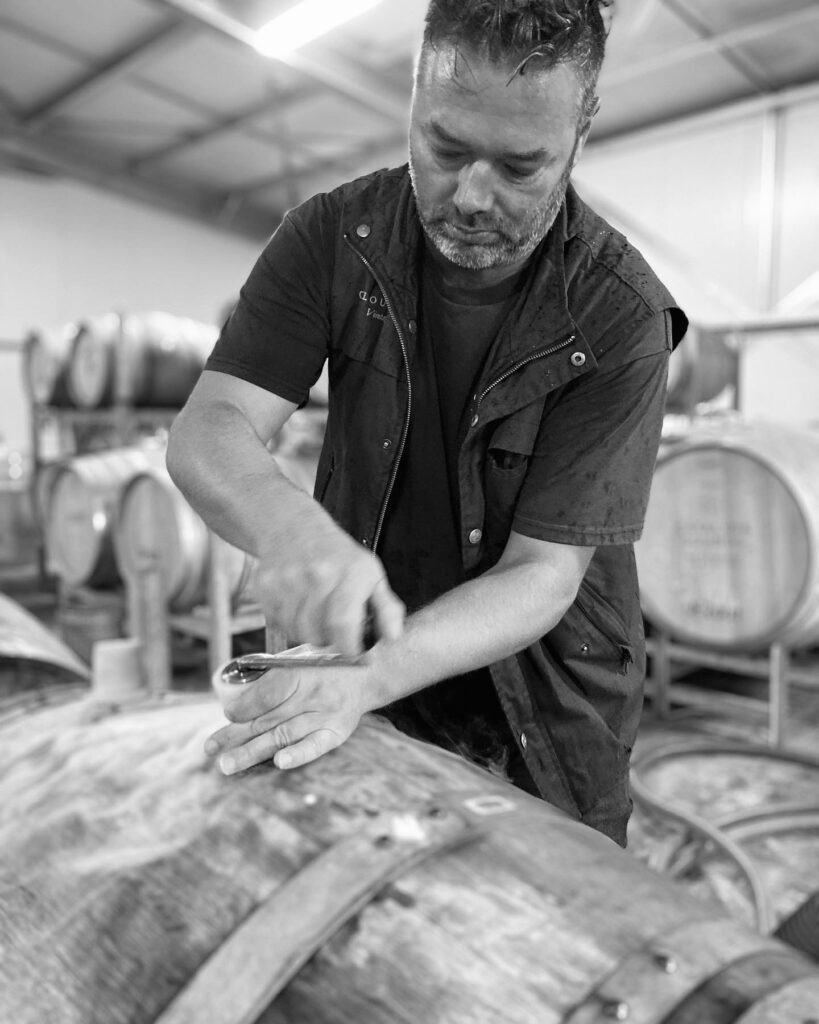
WF: Is there a moment in the winemaking year where you just ‘get a feeling’ for what’s going on / going to happen?
DS: Yes. For me it’s in the vineyard straight after veraison. The hard work has been done, you’re through the challenging periods and you cross your fingers that mother nature doesn’t destroy all the work that has been done in the vineyard. The viticulturalists are really the heroes of the wine industry and don’t get the recognition they deserve. Without good fruit you won’t make good wine.
From the winemaking point of view, I love to be first in the cellar first so I can open the door. If the smell is good, I know it’s a good vintage – good wine. With the reds, after malolactic fermentation is the best time for me. If it tastes good at this stage you know you will have great wine.
WF Are there any drinks that you enjoy, that people might be surprised to hear?
DS: A winemaker once told me – without drinking a lot of beer you can’t make good wine. I love the craft beer movement. When I grew up it was pretty stock standard beer but now the variety is unlimited and it is amazing how quickly that’s happened.
Blenheim’s local gin has just been named best in the world – and rightly so. It’s inspiring to see other locals doing exciting things.
WF: What do you think are any upcoming trends?
DS: I’m not a trend setter or looking too far outside what I am doing. I believe in finding what varietals works for the region and making better wine every year. With climate change having said that, maybe making something like Gamay would be pretty cool.
WF: We’ve just seen what can happen – in what ways do you think the NZ wine industry might be affected by Climate Change?
DS: Oh, man. This year has been insane. It’s heartbreaking and devastating. I feel for my friends up north. We all need to be serious about this and I think the industry knows it so I don’t need to talk too much about it. I would like to think everybody is adjusting their practices to reduce their impact, but when a cyclone is wiping out your region how do you move forward? You can’t control mother nature, but we can start to look into new areas of planting and new varieties and rootstocks.
WF: Do you have favourite wines from other people/places, and think “One day I’ll make something as good as that”? Do you have any stories to tell about discovering those?
DS: So many! I’m inspired by people, places, dinners. Enjoyment with people – that’s what I think wine is about. It is not about making a show wine. It’s about a wine that you enjoy with family and friends and have a good time. I have been lucky enough to taste some amazing wines but to be honest the ones I remember the most are the ones I shared with good company.
WF: Who would you most like to share a glass of your wine with (and why)
DS: Without a doubt I wish I could share a glass of Sorrell Wine with my dad. Unfortunately, he passed away before I bottled my first wines, but I know he was proud that I’d started to make my own wines, and pretty chuffed his name was on the bottle. We would have a great night of chats, laughter and good food.

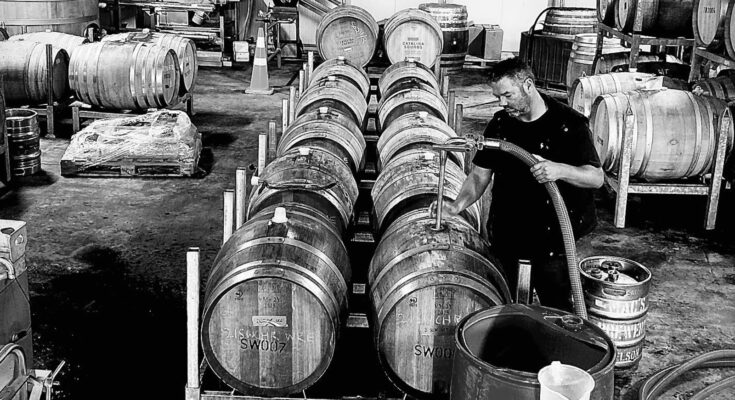
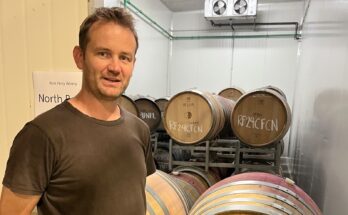
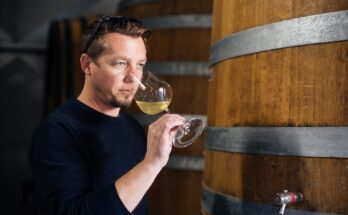
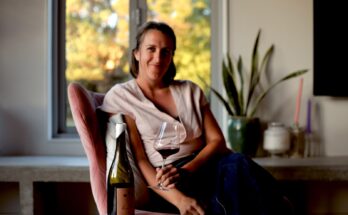
One Comment on “Winemaker series: Daniel Sorrell”